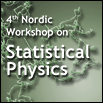Speaker
Dr
Oksana Manyuhina
(Nordita)
Description
The formation of spatially periodic patterns is a well-known
phenomenon in physics of liquid crystals. Nevertheless, new
experiments often pose questions which cannot be answered by
the existing theories. For example, the experiments in the
group of Anne-Marie Cazabat in Paris, demonstrated that thin
nematic films, spread on liquid substrates, exhibit a
long-wavelength periodically deformed stripe state up to the
thickness of 20 nm. The formation of this instability
pattern can be attributed to the response of the system to
the antagonistic boundary conditions. To get a theoretical
insight on the experimental findings, we (re)consider the
onset of stripe instability and (re)examine the role of
surface-like terms. Another experiments, performed by
Giorgia Tordini and Peter Christianen in Nijmegen, suggest
the formation of a finger-like pattern, when smectic order,
characterised by equally spaced layers, is imposed on the
bent nematic structure. I propose a simple geometric
approach of constructing the space-filling energy minimising
structure, which accounts for the bending of smectic layers
and yields two distinct wavelengths, compatible with
experimental data.

